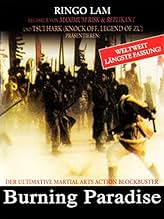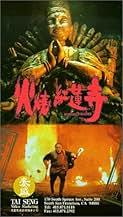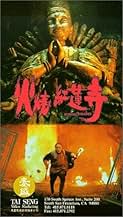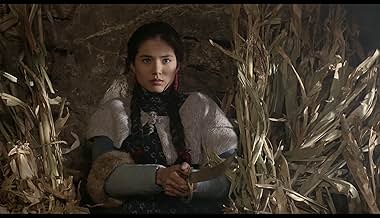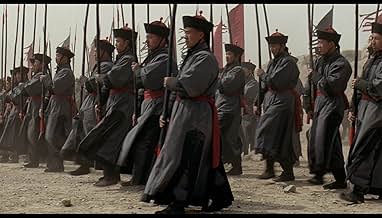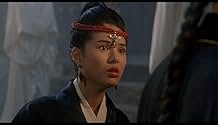IMDb RATING
7.0/10
1K
YOUR RATING
An exotic and legendary battle between the forces of good and evil comes to life when the celebrated disciples of the Shaolin Temple fight against the evil followers of China's Manchu rulers... Read allAn exotic and legendary battle between the forces of good and evil comes to life when the celebrated disciples of the Shaolin Temple fight against the evil followers of China's Manchu rulers.An exotic and legendary battle between the forces of good and evil comes to life when the celebrated disciples of the Shaolin Temple fight against the evil followers of China's Manchu rulers.
- Director
- Writers
- All cast & crew
- Production, box office & more at IMDbPro
Featured reviews
Nasty unrelenting action set in a prison that's itself a really creepy and important "character".
Top-notch wire work, good mix of fighting styles (including paint-fu!), and fine production values -- with the sore exception of some rubber weapons in the crowd scenes.
9 out of 10.
Top-notch wire work, good mix of fighting styles (including paint-fu!), and fine production values -- with the sore exception of some rubber weapons in the crowd scenes.
9 out of 10.
(1994) Burning Paradise
(In Chinese with English subtitles)
ACTION/ HISTORICAL FICTION/ COMEDY
Another 'Fong Sai Yuk' period period piece whereas most of the action takes place in the "Red Lotus Temple" similar to tombs the Indiana Jones does his adventures in except that the person who lives in this one pretty much may also be the one who build and designed it. Anyways, cult martial art figure baddie has main objective was to capture and destroy all the Shaolin Temples before making their pupils/ students to work as slaves for the "Red Lotus Temple" showcasing folk lore hero Fong Sai-yuk at beginning stages attempting to run away from being captured along with his Shaolin teacher but are eventually captured. Wires was used for the fights at the early stages but not so much as the film progresses.
Another 'Fong Sai Yuk' period period piece whereas most of the action takes place in the "Red Lotus Temple" similar to tombs the Indiana Jones does his adventures in except that the person who lives in this one pretty much may also be the one who build and designed it. Anyways, cult martial art figure baddie has main objective was to capture and destroy all the Shaolin Temples before making their pupils/ students to work as slaves for the "Red Lotus Temple" showcasing folk lore hero Fong Sai-yuk at beginning stages attempting to run away from being captured along with his Shaolin teacher but are eventually captured. Wires was used for the fights at the early stages but not so much as the film progresses.
I have always been keen on watching Hong Kong movies, but all of them failed to meet my expectations...until now! BURNING PARADISE doesn't contain the flat humor most HK movies have, nor a second rate story line that has been dragged into the film. The story is not complex, but there are never scenes that are just there to fill some "intelligent" space (the only truely intelligent martial arts film I have seen is CROUCHING TIGER, but since Hollywood is involved it is no true HK movie for me). There are some incredible fight scenes in this movie, from the first one(which is one of the coolest I have ever seen, yet so short) to the last main scenes! But mind, there's also a lot of blood that flows (people cut in half, decapitated, etc). The production is pretty good and the special effects show that the fantasy of the writer can be fulfilled even though some shots must be pretty technical (notice: the sheet of paper that he throws and got pinned into a wall!). Yep, it's not Tsui Hark or John Woo that made my favorite Hong Kong film, it's Ringo Lam! And I'm sure as hell going to check out more from this director! Ace.
"Burning Paradise" is a combination of neo-Shaw Brothers action and Ringo Lam's urban cynicism. When one watches the film, they might feel the fight scenes are only mediocre in nature but that doesn't matter, it's attitude and atmosphere that counts. This great film has both!! Always trying to be different than his contemporaries, Lam gives us to traditional heroes(Fong Sai-Yuk and Hung Shi-Kwan)and puts them in a "Raiders of the Lost Ark" setting. However, these are not the light-hearted comedic incarnations that you might see in a Jet Li movie. Instead these guys fight to the death with brutal results. What makes the film even better is that anyone could die at anytime, there is no holding back. Too bad, they don't make films like this more often.
10winner55
This is one of the finest films to come out of Hong Kong's 'New Wave' that began with Tsui Hark's "ZU: Warriors of Magic Mountain". Tsui set a tone for the New Wave's approach to the martial arts film that pretty much all the directors of the New Wave (Jackie Chan, Sammo Hung, Wong Jing, Ching Siu Tung, etc.) accepted from then on as a given; namely, the approach to such films thenceforth would need more than a touch of irony, if not outright comedy. "Burning Paradise" put a stop to all that, and with a vengeance.
It's not that there isn't humor here; but it is a purely human humor, as with the aged Buddhist priest at the beginning who somehow manages a quick feel of the nubile young prostitute while hiding in a bundle of straw. But this is just as humans are, not even Buddhist priests can be saints all the time.
When irony is at last introduced into the film, it is the nastiest possible, emanating from the 'abbot' of Red Lotus Temple, who is a study in pure nihilism such as has never been recorded on film before. He is the very incarnation of Milton's Satan from "Paradise Lost": "Better to rule in Hell than serve in heaven!" And if he can't get to Satan's hell soon enough, he'll turn the world around him into a living hell he can rule.
That's the motif underscoring the brutal violence of much of the imagery here: It's not that the Abbot just wants to kill people; he wants them to despair, to feel utterly hopeless, to accept his nihilism as all-encompassing reality. Thus there's a definite sense pervading the Red Temple scenes that there just might not be any other reality outside of the Temple itself - it has become all there is to the universe, and the Abbot, claiming mastery of infinite power, is in charge.
Of course, fortunately, the film doesn't end there. Though there are losses, the human will to be just ordinarily human at last prevails. (If you want to know how, see the film!) Yet there is no doubt that, in viewing this film, we visit hell. Hopefully, we do not witness our own afterlives; but we certainly feel chastened by the experience - and somehow better for it over all.
It's not that there isn't humor here; but it is a purely human humor, as with the aged Buddhist priest at the beginning who somehow manages a quick feel of the nubile young prostitute while hiding in a bundle of straw. But this is just as humans are, not even Buddhist priests can be saints all the time.
When irony is at last introduced into the film, it is the nastiest possible, emanating from the 'abbot' of Red Lotus Temple, who is a study in pure nihilism such as has never been recorded on film before. He is the very incarnation of Milton's Satan from "Paradise Lost": "Better to rule in Hell than serve in heaven!" And if he can't get to Satan's hell soon enough, he'll turn the world around him into a living hell he can rule.
That's the motif underscoring the brutal violence of much of the imagery here: It's not that the Abbot just wants to kill people; he wants them to despair, to feel utterly hopeless, to accept his nihilism as all-encompassing reality. Thus there's a definite sense pervading the Red Temple scenes that there just might not be any other reality outside of the Temple itself - it has become all there is to the universe, and the Abbot, claiming mastery of infinite power, is in charge.
Of course, fortunately, the film doesn't end there. Though there are losses, the human will to be just ordinarily human at last prevails. (If you want to know how, see the film!) Yet there is no doubt that, in viewing this film, we visit hell. Hopefully, we do not witness our own afterlives; but we certainly feel chastened by the experience - and somehow better for it over all.
Did you know
- TriviaNot related to the previous two Fong Sai-Yuk movies with Jet Li. Even if this was released only a year later and has some of the same style of comedy and martial arts action.
- ConnectionsRemake of Jiang hu qi xia (1965)
Details
Contribute to this page
Suggest an edit or add missing content

Top Gap
By what name was Le temple du lotus rouge (1994) officially released in India in English?
Answer
